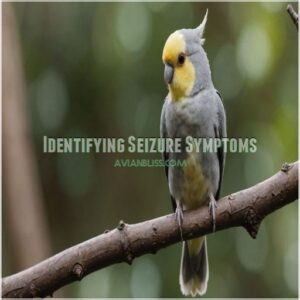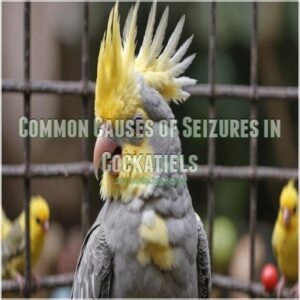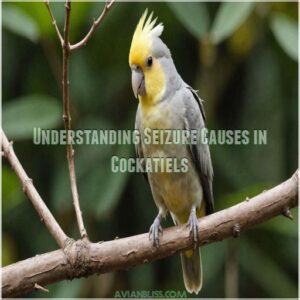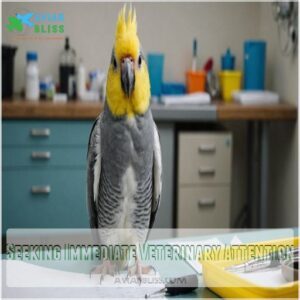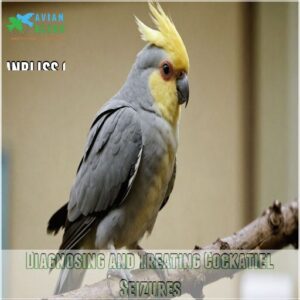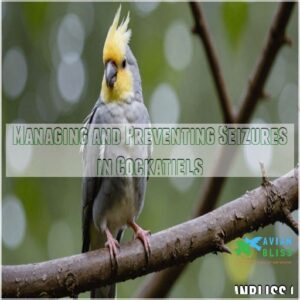This site is supported by our readers. We may earn a commission, at no cost to you, if you purchase through links.
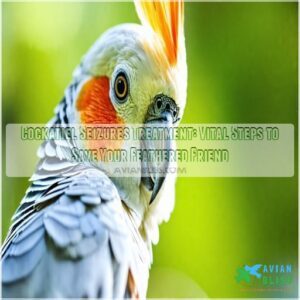
But don’t panic—you’ve got this!
Cockatiel seizures treatment requires immediate veterinary care.
You can’t stop the seizure yourself, but you can create a safe space by removing objects your bird might injure itself on.
Keep the room quiet and dim to reduce stress.
An avian vet will likely administer anti-seizure medications like diazepam to stop the episode.
They’ll then investigate underlying causes, which could range from nutritional deficiencies to infections.
Remember, your quick action can make all the difference.
Stay tuned for more on how to spot early warning signs and prevent future scares!
Table Of Contents
- Key Takeaways
- Recognizing Cockatiel Seizures
- Understanding Seizure Causes in Cockatiels
- Emergency Response to Cockatiel Seizures
- Diagnosing and Treating Cockatiel Seizures
- Managing and Preventing Seizures in Cockatiels
- Frequently Asked Questions (FAQs)
- How to help a bird having a seizure?
- What causes cockatiels to have seizures?
- Can seizures in birds be cured?
- What medication is used for seizures in birds?
- Can stress trigger seizures in cockatiels?
- Are certain cockatiel breeds more prone to seizures?
- How long does recovery take after a seizure?
- Can dietary changes help prevent cockatiel seizures?
- Is it safe to breed cockatiels with seizure history?
- Conclusion
Key Takeaways
- Create a safe environment during a seizure by removing hazards, dimming lights, and keeping your cockatiel warm.
- Seek immediate veterinary care for proper diagnosis and treatment, which may include anticonvulsant medication.
- Address underlying causes like nutritional deficiencies, especially calcium and vitamin D3, through diet improvements and supplements.
- Prevent future seizures by providing natural sunlight or UVB light, minimizing stress, and scheduling regular vet check-ups.
Recognizing Cockatiel Seizures
If you’ve noticed your cockatiel acting strangely, it might be experiencing a seizure.
Recognizing the signs of a seizure in your feathered friend is important for quick action and could save its life. Since constipation and seizures can sometimes be linked to underlying medical conditions, learning how to identify bird constipation warning signs is also crucial.
Identifying Seizure Symptoms
To recognize cockatiel seizures, you’ll need to keep a sharp eye out for unusual behavior.
Your feathered friend might be experiencing a seizure if you notice: Sudden twitching or tremors in their body or wings, which could be a sign of causes of bird seizures, such as infections, toxins, or environmental stress factors.
- Sudden twitching or
Distinguishing Between Focal and Generalized Seizures
Recognizing the difference between focal and generalized seizures in your cockatiel is important for proper treatment.
Focal seizures affect specific body parts, while generalized seizures impact the entire body.
Let’s break it down:
| Seizure Type | Body Involvement | Symptoms |
|---|---|---|
| Focal | Localized | Twitching in one wing or leg |
| Generalized | Entire body | Full-body convulsions |
| Mixed | Starts focal, becomes generalized | Begins in one area, spreads |
Watch for these signs to help your vet diagnose and treat your feathered friend effectively.
Common Causes of Seizures in Cockatiels
Now that you can spot the signs, let’s uncover what’s causing your feathered friend’s distress.
Cockatiel seizures often stem from a variety of culprits.
Calcium deficiency is a common troublemaker, along with its partner in crime, Vitamin B deficiency.
Head trauma can also trigger these scary episodes.
Don’t forget about pesky infections or stress – they’re seizure-causing culprits too.
Understanding these causes is your first step in tackling avian seizures head-on.
Understanding Seizure Causes in Cockatiels
Understanding why your cockatiel might have a seizure is important for effective treatment and prevention.
From brain injuries to nutritional deficiencies, there’s a range of potential culprits that can trigger these scary episodes in your feathered friend.
Physical Injury to The Brain
Your cockatiel’s delicate brain can be injured by tumors, strokes, or accidents.
These head injuries can trigger seizures, turning your feathered friend’s world upside down.
You can find helpful products for supporting a cockatiel’s recovery from brain injury at cockatiel brain care.
It’s like their brain’s wiring gets scrambled, causing uncontrolled
Nutritional Deficiencies and Low Blood Calcium
Cockatiels on seed-based diets often suffer from low blood calcium levels in birds, Two key culprits behind cockatiel seizures are nutritional deficiencies and low blood calcium.
You’ll want to focus on calcium-rich foods and vitamin D3 to support your feathered friend’s calcium metabolism.
Offer cuttlebone, dark leafy greens, and calcium supplements under vet guidance.
Don’t forget vitamin A – a betacarotene supplement can help prevent deficiencies.
By addressing these nutritional needs, you’re taking a big step in preventing calcium-related seizures and keeping your cockatiel healthy.
Infectious Diseases and Organ Disease
Invisible invaders can wreak havoc on your cockatiel’s health.
Bacterial, viral, and fungal infections can trigger seizures by attacking your bird’s nervous system.
Some viral infections like the avian influenza virus can spread quickly, posing a significant threat to your bird’s health.
Organ diseases like liver or kidney failure may also lead to these scary episodes.
Don’t panic! An avian vet
Environmental Stressors and Toxicities
Environmental factors can be just as dangerous as internal health issues for your cockatiel.
Poor housing conditions, toxic fumes, and excessive noise can all trigger seizures.
Keep your feathered friend’s space clean and well-ventilated.
Watch out for hidden dangers like lead poisoning from old paint or overheating from direct sunlight.
By controlling these environmental stressors, you’re not just preventing seizures – you’re creating a haven where your cockatiel can truly thrive.
Emergency Response to Cockatiel Seizures
When your cockatiel experiences a seizure, quick action can make all the difference.
Your immediate response should focus on creating a safe environment.
And seeking veterinary care to give your feathered friend the best chance at recovery.
Providing a Safe Environment
When your feathered friend is seizing, creating a safe haven is essential.
Lower perches and pad the cage floor with soft towels to prevent falls.
Dim the lights and find a quiet corner to reduce stress.
Think of it as crafting a cozy cocoon for your cockatiel.
Remove any potential hazards like toys or sharp objects.
Remember, a calm environment is your birdie’s best friend during these scary moments.
Offering Nutritious Food and Limited Water
After securing your cockatiel, focus on nutrition and hydration.
Offer easily digestible, nutrient-rich foods like soft fruits or cooked egg whites.
Be cautious with water – limit access to prevent accidental drowning.
Use a shallow dish or dropper for controlled hydration.
Remember, your feathered friend’s recovery diet is key.
Think of it as comfort food for birds – nourishing without overwhelming their system.
Your vet can recommend the best food choices for your cockatiel’s specific needs.
Supplemental Warmth and Supportive Care
Your feathered friend needs your TLC during a seizure.
Wrap them in a soft, warm towel – think of it as a cozy cockatiel burrito.
You can also consider using a cockatiel heating pad for supplemental warmth.
Keep the room quiet and dimly lit to reduce stress.
Offer small sips of water to prevent dehydration, but don
Seeking Immediate Veterinary Attention
In the face of a cockatiel seizure, time’s of the essence.
Don’t hesitate to rush your feathered friend to an avian vet.
If it’s after hours, seek out urgent care options.
While costs may vary, your bird’s life is priceless.
Ask about vet referral networks if specialized care is needed.
Post-seizure, follow your vet’s instructions to the letter.
Remember, quick action can make all the difference in treating bird seizures effectively.
Diagnosing and Treating Cockatiel Seizures
When your cockatiel has a seizure, it’s important to get an accurate diagnosis and appropriate treatment from a veterinarian.
They’ll run tests to identify the underlying cause and recommend a treatment plan that fits your bird’s needs, which may include addressing nutritional deficiencies, managing infections, or prescribing anticonvulsant medication to help your feathered friend recover and prevent future episodes.
Veterinary Diagnosis and Testing
Once at the vet’s office, your feathered friend will undergo a thorough examination.
The avian vet will piece together the puzzle of your cockatiel’s seizures through various tests. It’s like being a bird detective, searching for clues to solve the mystery of your pet’s health.
- Detailed health history review
- Thorough physical examination
- Blood tests to check for infections or imbalances
- Neurological exam to assess brain function
These steps help pinpoint the cause and pave the way for effective cockatiel seizures treatment.
Remember, you’re not alone in this journey – your vet’s expertise is your ally in getting through this challenging time.
Addressing Underlying Causes and Providing Supportive Care
Let’s zero in on getting your feathered friend back on track.
After your avian vet identifies the root cause, they’ll tailor a treatment plan.
This might involve tweaking your cockatiel’s diet, adding supplements like vitamin D3 or DMG, or adjusting their environment.
Low blood calcium? They’ll address that too.
Remember, supportive care is key – proper nutrition, a stress-free home, and lots of TLC can make all the difference in your bird’s prognosis.
Anticonvulsant Medication and Treatment Options
Your vet might prescribe anticonvulsants for your cockatiel’s seizures, and you can find reliable sources for cockatiel epilepsy medication online such as cockatiel epilepsy products.
These meds can be a game-changer, but they’re not without their quirks.
You’ll need to keep a close eye on dosage adjustments and potential
Preventing Future Seizures Through Calcium Supplementation
To ward off future seizures in your cockatiel, calcium supplementation is key. It’s like giving your feathered friend a shield against those scary episodes. Here’s what you need to know:
- Offer cuttlebone or mineral blocks for natural pecking
- Sprinkle powdered calcium on fresh veggies
- Mix liquid calcium into their water (follow vet’s dosage)
- Make sure proper vitamin D3 intake is happening for calcium absorption
- Consider uropygial gland health for overall well-being
Remember, balance is important. Too much calcium can be harmful, so always consult your vet for personalized advice.
Managing and Preventing Seizures in Cockatiels
You can take proactive steps to manage and prevent seizures in your cockatiel, ensuring a healthier, happier life for your feathered friend.
From providing proper nutrition and sunlight to minimizing stress and scheduling regular check-ups, these strategies will help safeguard your cockatiel’s well-being and reduce the risk of seizures.
Providing Natural Sunlight and UVB Light Sources
Sunlight isn’t just for sunbathing; it’s a lifeline for your cockatiel.
Natural rays or UVB lamps help prevent vitamin D3 deficiency, a sneaky culprit behind seizures.
Set up a cozy spot near a window or invest in a bird-safe UVB lamp.
Aim for 30 minutes of light exposure daily, but don’t overdo it – too much of a good thing can ruffle feathers.
Remember, a sun-kissed cockatiel is a happy, healthy one!
Balancing Diet and Ensuring Proper Nutrition
A well-balanced diet is the cornerstone of preventing seizures in cockatiels.
You’ll want to offer a variety of fresh foods rich in calcium and vitamins.
Mix in leafy greens, colorful veggies, and fruits to boost antioxidants.
Don’t forget about vitamin D3 – it’s essential for calcium absorption.
Consider adding a pinch of dimethylglycine to their food; it’s like a little brain booster for your feathered friend.
Minimizing Environmental Stressors and Toxicities
A balanced diet is just the first step in preventing seizures.
Let’s tackle the elephant in the room: your cockatiel’s environment.
Creating a stress-free zone is like building a fortress against seizures.
Here’s your bird-proof checklist:
- Nix toxic fumes: Say goodbye to non-stick cookware and air fresheners
- Hush the noise: Keep the volume down and create quiet zones
- Control the thermostat: Maintain a cozy 65-75°F (18-24°C)
- Declutter: Remove potential hazards and create a safe playground
Remember, a happy bird is a healthy bird!
Regular Veterinary Check-Ups and Monitoring
Regular check-ups with your avian vet are the cornerstone of preventing seizures in cockatiels.
These visits allow for early detection of potential issues and disease prevention.
During wellness exams, monitoring your cockatiel’s droppings can provide valuable insights into their health, as changes in droppings color, consistency, or frequency. During wellness exams, your vet can perform routine bloodwork to monitor your bird’s health.
Don’t wait for symptoms to appear; proactive care is key to managing epilepsy in birds.
| Preventative Care | Benefits |
|---|---|
| Wellness Exams | Peace of mind |
| Routine Bloodwork | Early warning |
| Nutrition Review | Healthier bird |
Remember, you’re not just caring for a pet, but nurturing a feathered friend who relies on you for their well-being.
Frequently Asked Questions (FAQs)
How to help a bird having a seizure?
Picture your feathered friend trembling like a leaf.
Stay calm.
Create a safe haven: dim lights, soft padding.
Keep ’em warm, but don’t smother.
Lower perches, limit water.
Your swift action is vital – get to the vet pronto for expert care.
What causes cockatiels to have seizures?
Your cockatiel’s seizures can stem from various factors.
Brain injuries, nutritional deficiencies, infections, or organ diseases might be culprits.
Environmental stressors like overheating or toxins can also trigger them.
It’s very important to consult a vet for proper diagnosis and treatment.
Can seizures in birds be cured?
Just as a puzzle needs all its pieces, curing bird seizures depends on finding the root cause.
You’ll work with your vet to diagnose and treat the underlying issue, which could lead to a full recovery or effective management.
What medication is used for seizures in birds?
Vets often prescribe anticonvulsants like phenobarbital or diazepam for bird seizures.
The choice depends on the underlying cause and severity.
It’s important to consult an avian vet for proper diagnosis and treatment that’s specific to each bird, as dosages are bird-specific.
Can stress trigger seizures in cockatiels?
Imagine your cockatiel’s health hanging by a thread.
Stress can indeed trigger seizures in these sensitive birds.
Environmental changes, loud noises, or even new cage mates might set off an episode.
You’ll need to create a calm, stable environment to protect your feathered friend.
Are certain cockatiel breeds more prone to seizures?
While all cockatiels can potentially experience seizures, there’s no evidence that certain breeds are more prone.
Genetic factors may play a role, but environmental stressors, nutritional deficiencies, and health issues are more likely triggers for seizures in cockatiels.
How long does recovery take after a seizure?
Like a storm passing, recovery from a seizure varies.
Your bird may bounce back in minutes or need a few hours.
Keep them calm and comfortable.
Monitor closely for 24-48 hours, watching for lingering effects or recurrence.
Can dietary changes help prevent cockatiel seizures?
Dietary changes can indeed help prevent seizures in cockatiels.
You’ll want to focus on a balanced diet rich in calcium and vitamin E.
Make sure they’re getting enough natural sunlight or UVB light for proper calcium absorption.
Consult your vet for personalized advice.
Is it safe to breed cockatiels with seizure history?
Just as Icarus flew too close to the sun, breeding cockatiels with seizure history is risky.
You’re playing with genetic fire.
It’s not recommended, as it could pass on health issues to offspring.
Consult an avian vet for guidance.
Conclusion
Imagine your cockatiel, Sunny, suddenly flapping wildly and falling off its perch.
Your quick action, following the steps for cockatiel seizures treatment, could save its life.
Remember, while seizures are scary, they’re often manageable with proper care.
Stay vigilant for signs, maintain a healthy diet and environment, and keep up with regular vet check-ups.
With your dedication and the right treatment approach, your feathered friend can continue to thrive, filling your home with cheerful chirps for years to come.

